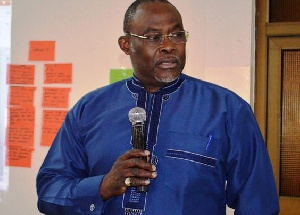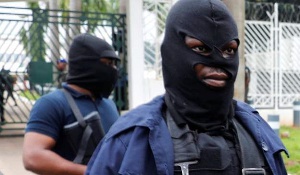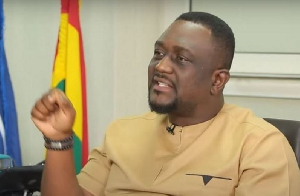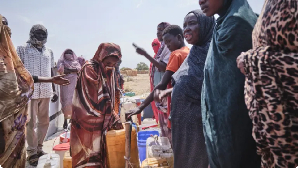The aspiring flagbearer of the National Democratic Congress, Spio-Garbrah, could not have been entirely correct for wildly conjecturing that the spate of armed robberies in the country is as a result of the government’s inability to reprimand the vigilante groups within the ruling New Patriotic Party (See: ‘NPP vigilante groups emboldened armed robbers ‘- Spio-Garbrah; ghanaweb.com, 03/03/2018).
Apparently, I have pointed out severally that some of us witnessed the appalling events which took place over a period of three decades (1970-1990s), and hence cannot be hoodwinked or proselytised by the propagandists.
I have also stressed time and time again that when experienced politicians keep holding on to vague rhetoric and political inebriations with a view to deceiving the unsuspecting Ghanaians, it gives some of us every reason and the energy to confute such wrench.
Of course it is baffling to keep reading and listening to the baseless claims from the NDC quarters that it was rather the NPP Party that introduced vigilantism and lawlessness in Ghana politics.
Well, I am pretty sure that there are more than two vigilante groups in Ghana. So why did Dr Spio-Garbrah only find it somewhat convenient to limit his scope to the ‘Invincible and Delta Forces?
Frankly speaking, in as much as the Delta Force’s previous abhorrent action at the Kumasi Circuit Court was utterly out of order, I do not want to subscribe to the seemingly sophistic view that their disgusting action is alien to Ghana politics.
In any case, whilst discerning Ghanaians have every right to ventilate their arousing disgust over the apparent reprehensible action by the vigilante groups, it would be absolutely wrong for anybody to suggest that the ‘Invincible and Delta Force’s despicable actions are unheard of.
Believe it or not, the ‘Invincible and Delta Force’s revoltingly ugly actions do not supersede the relentless harassments we received from the paramilitary groups which were created by the founders of the NDC.
Verily, it was the founders of the NDC who set up paramilitary organs such as the People’s Defence Committee (PDC), the Civil Defence Organisation (CDO), which was popularly known as the Militia and the Workers Defence Committee (WDC), where the last two organs were later reorganised and renamed as the Committee for the Defence of the Revolution (CDR), whose collective mandate was to defend the revolution by hook or by crook.
“The PDCs and the WDCs (Workers Defence Committees) had their own courts and "meted out justice according to no established legal procedures” [Amnesty International, 1983).
It was however rumoured that when Ghana returned to democratic rule in 1993, some members of the paramilitary groups who could not get the opportunity to join any of the security services bolted with their guns.
Consequently, armed robberies and other heinous crimes increased exponentially in the early days of the Fourth Republic in 1993. Unfortunately, however, the armed robbery menace has continued unabated.
And, we have regrettably sat apathetically over the years and allowed the boisterous homicidal brats and other ill-motive paramilitary groups to cause havoc to innocent Ghanaians.
If we stroll down memory lane, in their desperate attempts to defend their illegitimate power and lay the foundation for a supposedly true democracy in Ghana, the PNDC regime created a controversial countrywide network of People's Defence Committees (PDCs) and Workers' Defence Committees (WDCs), reorganised and renamed, in late 1984 as Committees for the Defence of the Revolution (CDRs).
The CDRs were established in villages, urban communities, and workplaces and intended to be the organs of popular power and political initiative.
In addition, Forces' Defence Committees were established in the armed forces and the police service.
The most important aspect of the reorganization of the PDCs and the WDCs from the standpoint of the political and socioeconomic functions of the CDRs was the opening up of membership to all Ghanaians.
This decision reversed the earlier exclusion from PDC/WDC membership of elite groups, such as chiefs and so-called exploiting classes. The change returned the revolution to its original objective of involving all Ghanaians in decision making and opened up possibilities for genuine national reconciliation.
According to official directives, the principal functions of the CDRs were to ensure democratic participation in decision making in all communities and workplaces; to guard against corruption, abuse of power, sabotage, and social injustice; and to promote sustained national productivity by focusing efforts on the productive sectors of the economy.
The other mass organizations of the revolution were the National Mobilisation Program, the 31st December Women's Movement, the Civil Defence Organisation (the militia), the National Youth Organising Commission, and the June Four Movement.
The National Mobilisation Program started as an emergency programme to receive and resettle Ghanaian returnees from Nigeria in 1983. It soon developed into a cooperative movement engaged in a variety of economic and community development projects throughout Ghana.
The 31st December Women's Movement aimed to bring about the political, social, and economic emancipation of Ghanaian women, especially rural women.
The Civil Defence Organisation, popularly known as the militia, was set up as a paramilitary institution to assist other state organizations in national emergencies such as invasions, bush fires, and floods. Members received special training in combat readiness to defend the nation against internal and external aggression and economic sabotage.
The militia, in addition to combating crime in local communities, engaged in voluntary social and economic activities to help promote community development. In this effort, it was often assisted by the National Youth Organising Commission, created in 1982 as part of the PNDC's efforts to establish a youth movement to carry out the objectives of the 31st December 1981 Revolution.
The June Four Movement was a militant mass revolutionary movement dedicated to keeping alive the ideals of the June 4, 1979, uprising that Rawlings had led. It sought to arouse the population at large to assist in establishing so-called people's power within the avowed objectives of the revolutionary process.
On a practical level, it worked with the militia and the National Youth Organising Commission in various community development projects.
Participatory opportunities of the ordinary Ghanaian citizen were significantly expanded through membership in revolutionary organs.
Before the establishment of the district assemblies in 1989, the PNDC government was able to reach the rural population and to broaden its base of support by direct consultation.
This was achieved through chiefs, the CDRs, and other national bodies such as the Democratic Youth League of Ghana, which in 1988 claimed a nationwide membership of more than 100,000. Other such groups included farmers' organizations, market women's associations, trade union groups, students' organizations, and religious and other bodies.
The PNDC's political opposition back then, however, hotly contested the democratic nature of such organs and saw them as nothing but state-sponsored vigilantes engaged in intimidation and human rights abuses (Source: U.S. Library of Congress).
In the light of the above exposition, it would be hypocritical on the part of anyone who attempts to put all the blame on the NPP Party with regard to the creation of vigilante groups in Ghana politics.
K. Badu, UK.
References:
www.ghanapoliticsonline.com
www.ghanaweb.com
Amnesty International (1983), ‘Amnesty International's Concerns in the Republic of Ghana: An Amnesty International Background Paper. London: AI
U.S. Library of Congress (2017), ‘Ghana: The Revolutionary Organs’, (online). Available: countrystudies.us/Ghana/93.htm
Rawlings, J. J. (2017), ‘June 4 Full Speech, (online). Available: www.starrfmonline.com
Badu, K. (2017), ‘Bongo MP, It Was The NDC That Came Out of Coup d’états’, (online). Available: www.ghanaweb.com
Opinions of Wednesday, 7 March 2018
Columnist: Kwaku Badu















